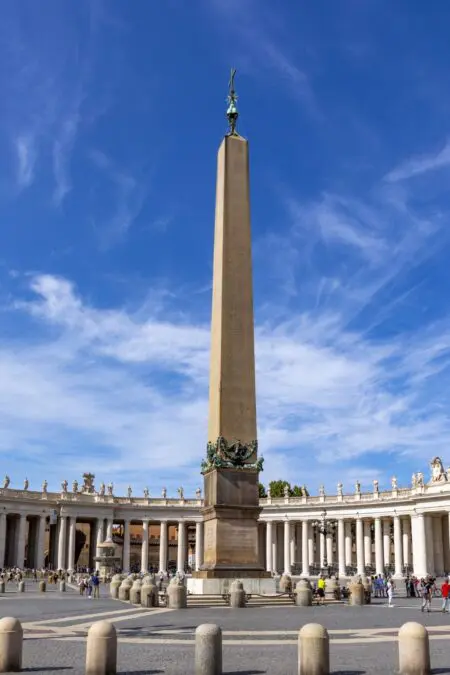The obelisk is subject to exorcism.
If you have visited the Vatican or watched the Pope’s greeting on television on a major holiday such as Easter, you may have noticed that there is an Egyptian obelisk in St. Peter’s Square in the papal state.
But what does Ancient Egypt have to do with the Roman Catholic Church, and how did this obelisk appear there?
First of all, it should be noted that there are many obelisks around the world, but not all were made in ancient Egypt. Of those that are certainly produced in the lands of the Nile, most are now found around the world (nearly 30 in Rome, New York, Paris, Istanbul and other cities), and only six are located in Egypt itself.
Obelisks are funerary monuments that symbolize a ray of sunshine and were usually found on them
The obelisk in the Vatican is 25 meters high and has no hieroglyphs. It weighs 330 tons, with only its base being 175 tons.
Where does the Vatican obelisk come from?
According to archeological research, the obelisk, which is located in St. Peter’s Square, was made in Heliopolis, Ancient Egypt, but it is not known at the time of which pharaoh.
Then began its relocation according to the tastes and whims of the Roman emperors. Octavian Augustus first moved him to Alexandria, Egypt, in 30 BC, and then Caligula ordered him to be sent by ship to Rome (after ordering the destruction of the Alexandria Forum).
In order not to break during transportation, the obelisk was loaded on the ship together with 1000 tons of lentils. After completing its task, the ship was filled with volcanic ash and sunk near today’s Ostia to become the base of the quay.
The obelisk finds itself in the center of Caligula’s favorite circus. The remains of the circus lie below St. Peter’s Square and St. Peter’s Basilica in the Vatican. Later, this circus became known as the Circus of Nero and not only organized chariot races, but also made public executions of Christians. According to legend, the apostles Peter and Paul themselves were killed at this place.
How did the obelisk become a Christian symbol?
The obelisk remained in place for more than 1,500 years, until in 1586 Pope Sixtus V decided to move it a few hundred meters to the side, in the center of the square in front of the then-newly built basilica. The pope had the idea of rebuilding all the obelisks that were then in Rome.
It takes 900 men and 75 horses to move the obelisk to its new location and erect it. Their task takes 13 months, and for this purpose a wooden tower with a system of ropes was built, thanks to which the granite pillar was lowered and moved gradually and unharmed.
To make sure that the obelisk would not become a place of idolatry, the pope performed an exorcism ritual and then ordered a cross to be placed on top.
A curious fact is that the text of the exorcism can still be seen – it is engraved in Latin on the western and eastern parts of the obelisk.






